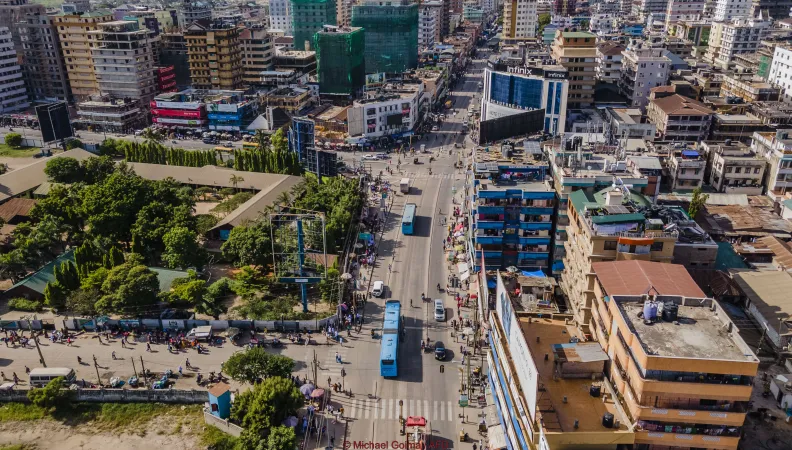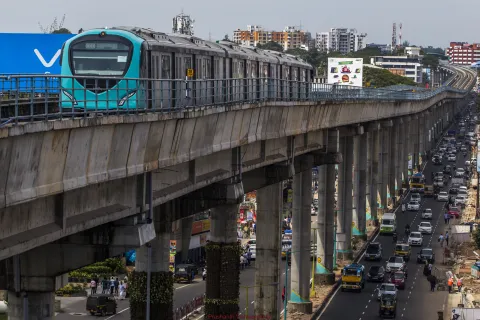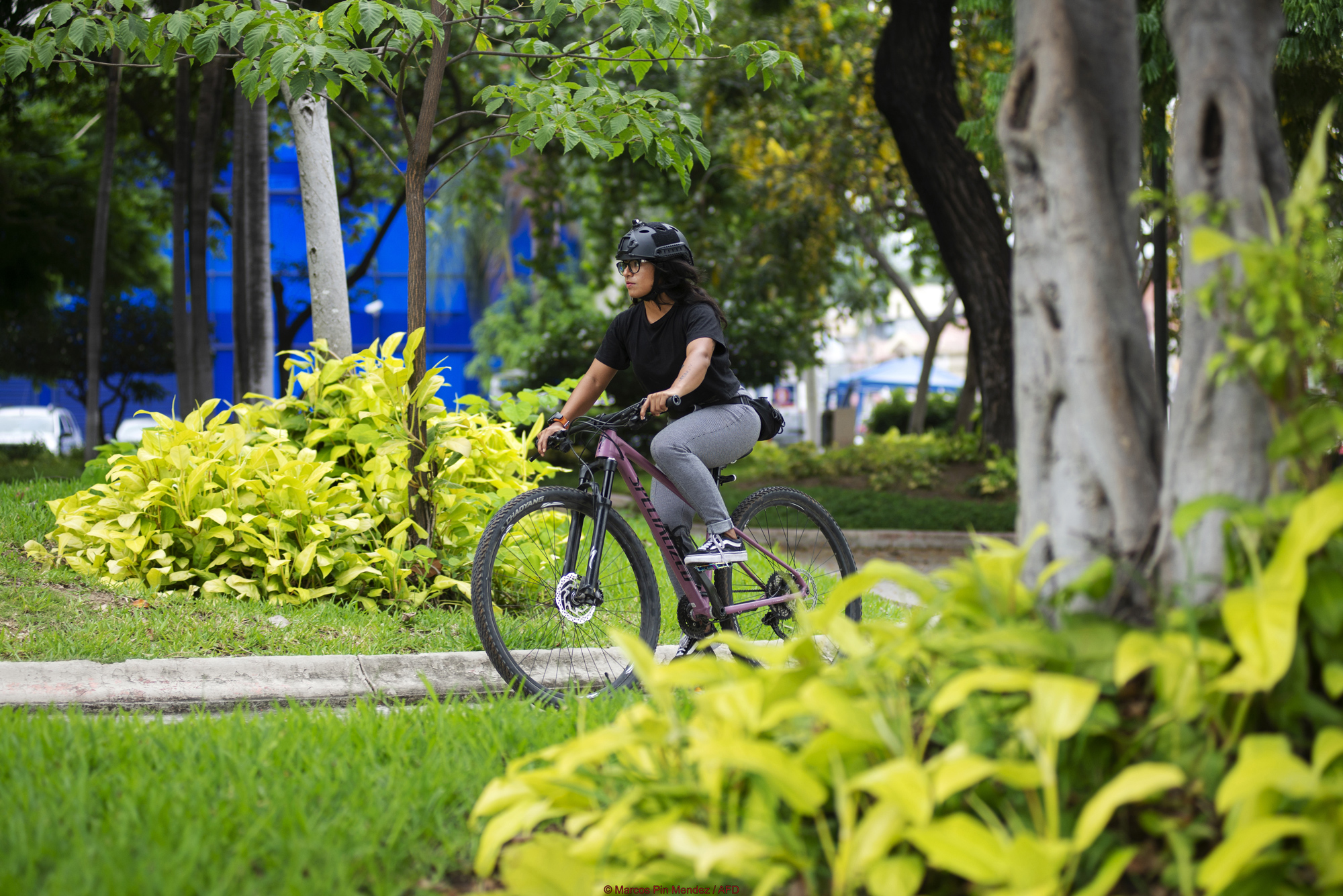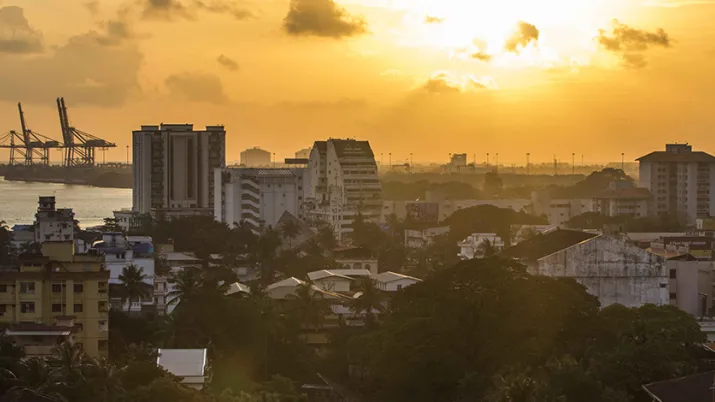Share the page
Sustainable Cities – Our Actions and Impact

Avec plus de la moitié de la population mondiale vivant en ville, les centres urbains concentrent les emplois et services et contribuent à hauteur de 80 % du PIB mondial.
Experiencing extremely rapid demographic growth—particularly in Africa and Asia—cities pose numerous global challenges:
- Accessibility: ensuring access to public services for all;
- Uncontrolled urbanization: an increasing number of urban dwellers live in under-equipped neighborhoods and precarious housing, trapping residents in situations of social exclusion and segregation;
- Population vulnerability: the growing frequency of natural hazards threatens vulnerable populations, especially in cities where urbanization is poorly managed;
- Pollution and ecological impact: pollution caused by human activity in urban areas;
- Climate: the need to adapt to climate change and reduce cities' impact on biodiversity and the climate.
This is why, as the French technical cooperation agency, we are committed to facilitating the transition toward more sustainable cities—capable of welcoming current and future generations under the best possible conditions.
55% of the world’s population lives in urban areas
And this proportion is expected to rise to 70% by 2050, while by 2030, 29 additional cities will have surpassed the 5-million-inhabitant mark, including 15 in Asia and 10 in Africa. Nearly 70% of infrastructure will be built in the coming years in developing countries.
Our Strategic Priorities
As they concentrate productive activities, cities are responsible for over two-thirds of greenhouse gas emissions, and their expansion reduces their ability to act as carbon sinks. At the same time, the combination of increasingly frequent and intense climate hazards—driven by climate change—and high population density in often unplanned areas increases their vulnerability.
Our efforts to promote the emergence of sustainable cities are built around three key pillars:
- Supporting climate transition and enhancing urban biodiversity:
We support our partners in their efforts to mitigate and adapt to the effects of climate change through resilient urban planning and development (density, compactness, functional diversity, accessibility). In doing so, we contribute to scaling up adaptation and decarbonization efforts, which may include nature-based solutions.
- Empowering urban stakeholders and promoting participatory processes in city-making:
As the first level of citizen representation and a key tier of urban governance, cities often lack the human and financial resources, as well as the devolved competencies, needed to fully exercise their responsibilities. We therefore work to ensure that residents—including vulnerable populations and those excluded from planning and decision-making processes—are meaningfully included in shaping the city. This is achieved by strengthening local authorities and urban governance tools, particularly by integrating informal actors.
 © Prashanth Vishwanathan - AFD
© Prashanth Vishwanathan - AFD
- Reducing territorial, social, and gender inequalities:
Our projects aim to reduce inequalities within a given territory by strengthening support to intermediate cities. We prioritize disadvantaged areas to improve access to urban services, create economic opportunities, and foster spatial and social reconnection with the rest of the city. We also raise awareness on promoting social diversity through the development of public spaces, citizen participation in urban planning, and the creation of economic opportunities. We support our partners in integrating the specific needs of women and girls into urban policies and planning, as well as in improving their access to services.
Our Framework for Action
Our work aligns with the priorities of several international frameworks, starting with Sustainable Development Goal 11 (SDG 11), which calls to “make cities and human settlements inclusive, safe, resilient, and sustainable,” and the Paris Agreement, which confirmed the central role of cities in both climate change mitigation and adaptation.
Our actions are also aligned with the New Urban Agenda, adopted at the Habitat III Conference in 2016, which aims to make cities and human settlements inclusive, safe, resilient, and sustainable. It reaffirms the four key dimensions of sustainable urban development—social, economic, environmental, and spatial—and defines priority actions to accelerate the implementation of this objective.
Lastly, we follow the guidelines of the Kunming-Montreal Global Biodiversity Framework, adopted in 2022 at COP 15 on biodiversity, which encourages local authorities to preserve and restore biodiversity by improving urban green spaces and ecological connectivity in cities.
Our Service Offering
Our service offering in the area of sustainable cities is structured around five key pillars:
- Strengthening the capacities of urban stakeholders:
This includes providing advisory support to local authorities to help them define strategic priorities and investment plans. We also assist our partners in building their capacities through training, the development of methodological guides, and the facilitation of stakeholder engagement mechanisms—such as webinars, thematic workshops, best practice sharing, and experience feedback. Additionally, we support the development of urban data collection and analysis systems to help urban actors enhance their public policies (e.g., geographic information systems, local databases, etc.). - Supporting local authorities in sustainable urban planning:
We work with local authorities to update and harmonize urban planning regulatory frameworks and to strengthen mechanisms for monitoring urban development (building permits, environmental and social management plans, management tools, etc.). We also contribute to the development and revision of urban planning documents (master plans, zoning plans, etc.) that incorporate environmental considerations, while promoting citizen participation in city-making.

- Contributing to resilient urban development and improving equitable access to urban services:
We support local authorities and operators in the development of urban services and infrastructure through planning, design (including nature-based solutions, eco-urbanism principles, and resilience strategies), and investment implementation. This includes targeted training and the development of management and operational tools to ensure the sustainability of infrastructure and the accessibility of services for the most vulnerable (e.g., user behavior analysis, user profiles, pricing policies, etc.). - Supporting improved waste management:
Our agency assists cities and partner local authorities in strengthening the entire value chain of solid waste management: from generation and pre-collection to collection, transport, treatment, and recovery. The objective is to ensure that quality waste services are accessible to all residents. - Promoting sustainable mobility:
We support mobility authorities in developing sustainable urban mobility strategies that are well aligned with broader urban policies (such as low-emission zones and pedestrianized city centers). Our support includes promoting and strengthening public transport systems, modernizing management and ticketing systems, and encouraging intermodality, active transportation, and soft mobility solutions.
Download resources
FAQ – To Go Further
More information on sustainable cities
A sustainable city is an urban area that meets the needs of its current inhabitants without compromising the ability of future generations to meet theirs. A sustainable city respects the environment and addresses issues of inclusiveness, climate, and biodiversity preservation.
Improving access to and the quality of urban services is a fundamental condition for a city to be both sustainable and inclusive.
Urban planning and development are strategic levers for sustainable territorial development, as they help structure space in a way that meets the growing needs of populations by expanding access to urban services—while minimizing environmental impact.
Well-designed urban planning contributes to:
- Reducing greenhouse gas emissions (by limiting urban sprawl and promoting soft mobility);
- Enhancing equitable access to urban services (such as drinking water, sanitation, waste management, public spaces and green areas, and commercial infrastructure);
- Preserving natural areas and strengthening resilience to climate-related risks.
Urban planning is therefore inseparable from sustainability goals in cities, as demonstrated by Expertise France’s work in urban service planning and infrastructure development.
Adapting cities to climate change requires the implementation of innovative urban development projects that promote ecosystem-based solutions (such as soil permeability, greening, and circularity) and the principles of eco-urbanism (green and blue infrastructure, reduction of urban air pollution, sustainable construction materials, etc.).
It also involves mapping risk-prone areas and integrating these risks and preservation measures into urban planning documents. This enables cities to better protect their residents, reduce material damage, and adapt to a constantly changing environment.
Several projects led by Expertise France illustrate the concept of sustainable cities:
- Urbayiti (Haïti) : urban governance and community resilience;
- Villes durables au Ghana : city observatory, service access, and waste management;
- Plateforme urbaine au Cameroun : national coordination and improved access to urban data, including issues of inclusion and resilience;
- GEDEC Togo : development of solid waste management and sanitation services;
- REGUL (RDC) : capacity building for local authorities in Kolwezi (territorial development and urban planning).
A sustainable city is built on several key components:
- Balanced urban planning (including functional diversity, density, and eco-urbanism);
- A city that fosters citizen participation and inclusive governance;
- Equitable access to essential urban services (such as water, sanitation, mobility, and waste management);
- Biodiversity preservation and climate adaptation;
- Actions supporting the circular economy and pollution reduction.
Sustainable Development Goal 11 (SDG 11) focuses specifically on cities: “Make cities and human settlements inclusive, safe, resilient, and sustainable.”
It is supported by several other SDGs that are closely linked to urban environments:
- SDG 6: Clean water and sanitation
- SDG 7: Affordable and clean energy
- SDG 9: Industry, innovation and infrastructure — fostering innovation for more sustainable cities
- SDG 10: Reduced inequalities
- SDG 13: Climate action
To become sustainable, cities must:
- Strengthen the capacities of local authorities in urban planning and public service management;
- Co-develop urban policies with citizens through inclusive participation;
- Plan urban development in an integrated manner, anticipating climate-related risks;
- Invest in green, low-carbon, resilient, and accessible infrastructure for all;
- Support innovation in areas such as sustainable mobility, waste management, and access to housing.
Our projects

Chiffres clés
- 10 Countries concerned by Sustainable Urbanization and Access to Urban Services
- 39 millions of euros by volume of activity
Our other fields of action
-
Climate
-
Agriculture
-
Energy
-
Biodiversity
-
Circular economy
-
Water
